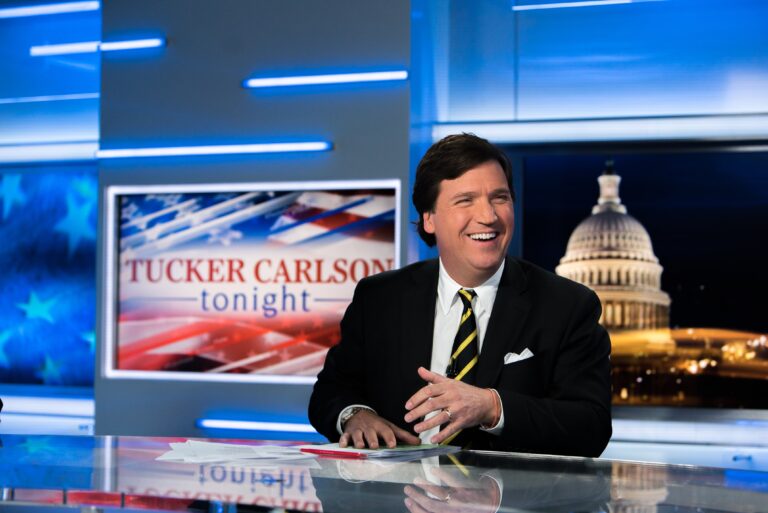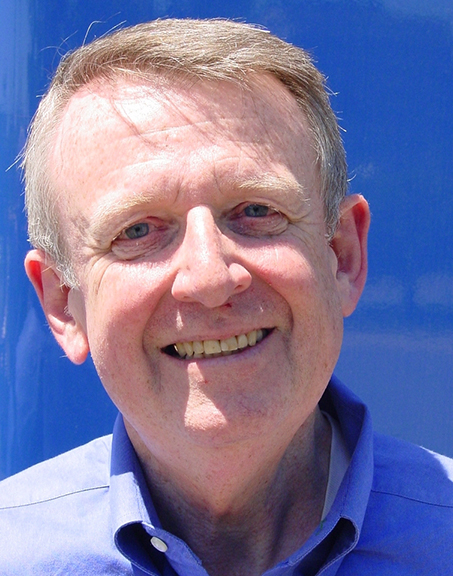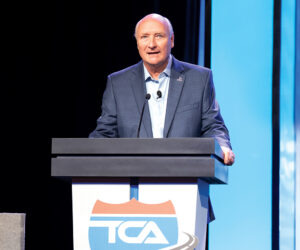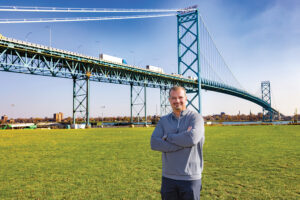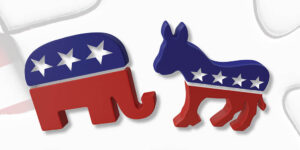Quick, intelligent and adaptable, Tucker Carlson is on top of his game as host of FOX News’ ‘Tucker Carlson Tonight’
This article first appeared in the December/January issue of Truckload Authority, the official magazine of the Truckload Carriers Association.
By Lyndon Finney
There is a new star in the Fox News universe.
Although he’s been in the television business since 2000, for various reasons he’s now comfortably settled into the coveted 8 p.m. Eastern time slot with his show.
Meet Tucker Carlson, former bad student (that’s why he wound up in journalism), liberalist conservative (our choice of terms based on a recent interview) and a straight, forward-thinking, all-around good guy (except according to some Democrats out there).
His FOX News “Tucker Carlson Tonight” was the third-best rated cable news program in November with 2.825 million viewers. Fox’s “Hannity” was first with 3.026 viewers. Among the 24-54 age group, he was second behind “Hannity.”
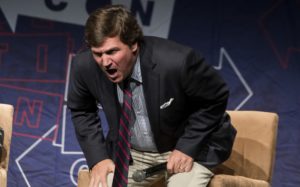
Before joining Fox, he’d worked at CNN and MSNBC, the latter being where he was fired when the network took Keith Olbermann’s lead and turned very liberal.
Born in California, he’s been a Washington, D.C., resident pretty much ever since.
“It’s a very nice place to live, and there are obviously unsavory elements in Washington,” he said. “But it’s been a nice place to raise kids. I have four of them and two dogs and the same wife I’m proud to say.”
He wound up in journalism because of less-than-desirable grades when his father, also a journalist, told his job-searching son he ought to try journalism. “They’ll take anybody,” his father told him.
“So, I kind of got into it by accident because I didn’t do very well in school and the barrier to entering journalism is very low,” Carlson says now. He says looking back he just had an affinity for journalism, something few today would argue with.
That was 27 years ago and with a couple of exceptions — a time in Little Rock, Arkansas, where he worked for the statewide Arkansas Democrat Gazette newspaper and time spent in New Jersey — he’s been a D.C. resident.
He was working in print journalism early in his career when one day he came back from lunch and the receptionist told him TV’s “48 Hours” was looking for someone to comment on O.J. So he did.
“That led to a chain reaction that brought me to CNN within a year,” Carlson said recently. “Television is very different from print because it’s about speaking, not writing. And then there’s the visual elements. It’s a hard medium to master. It’s hard to be good at it. I’m not convinced I am good at it. I don’t fully understand it but it’s exciting and it’s interesting and I’ve really enjoyed it.”
So much so that during an interview with Truckload Authority he laughed, was straight-forward in discussing his views, talked about today’s media and had a new spin on why trucking is so important to America.
Tell us about your journey through CNN, MSNBC and Fox:
Things have changed a lot in the past 20 years. When I worked at CNN it was posing as a centric news organization. It was not explicitly partisan in the way that it is now. Now it’s just a working of the Democratic Party, but that wasn’t how CNN saw itself when I worked there. … There are some smart people there. I never thought the management was impressive because they weren’t. But I knew a lot of nice people there. And then I went over to MSNBC at a time when they were trying to become a conservative channel and I spent four years there. During that time they became liberal. Keith Olbermann took a pretty aggressive position against [President George W.] Bush and they got good ratings by doing that and they decided to change the format to become a left-wing channel, which wasn’t a crazy idea, by the way. And I didn’t fit and so they fired me. They were very nice to me, though, I have to say. They weren’t nasty at all. They were honest with me and said, “We’re becoming a liberal channel and you’re not in the boat, so you have to leave.” And I said, “that makes sense.” And then about nine-and-a-half years ago, Roger Ailes was nice enough to hire me.
Did he contact you or did you seek him out?
He actually did. I was up in Maine fishing and Ailes called my cell phone and said, “I heard you’re getting fired from MSNBC.” And I said, “I think I am.” And he said, “why don’t you come to New York and see me?” I went to see him and he couldn’t have been nicer. I had known him before and he said, “Um, I’ll hire you and pay you nothing and you can work your way back into the business.” And I said, “OK, sounds like a good deal.” So I made a couple of documentaries for the channel in 2009. And then he hired me as like a freelance political analyst, and then after a few more years he hired me to do “Fox and Friends” on the weekends, which I loved. And I did that for four years. Then Greta Van Susteren left the channel and I took her time slot at 7. And then Megyn Kelly left and I took her time slot at 9. And then Bill O’Reilly left and I took his time to be where I am now.
Who’s next?
[Laughter.] I don’t want to move. I’m really enjoying it. It’s great show to watch and a great hour to make TV. It’s a nice hour to work in and it fits my natural rhythms and I really enjoy it. I think we’ve got the best staff ever assembled in news, really smart, really hardworking, good people. And it’s been fun every single day. And to its unending credit, it has given me total editorial freedom to say whatever I think is true. You know, obviously you have to be careful about your facts and you don’t want to be inaccurate and when we’ve made mistakes, I think we’ve corrected them immediately as you should, but Fox has never told me what to say, what to believe, what not to say. They’ve really given me as much freedom as you can give a journalist and I know what a rare thing that is because I didn’t have that at MSNBC or CNN. If you took a position they didn’t like, they would tell you about it, then they’ll try and force you to toe the party line, particularly at CNN, and Fox doesn’t do that. So that’s a real blessing.
In your show, do you feel an obligation to entertain as opposed to being hard-hitting?
No, I feel just the opposite, actually. I think we’re at a profound moment in American history, meaning it’s not just that we elected a president we didn’t expect to elect. It’s that everything is changing. Both political parties are changing, the economy is changing, the population of the country is changing. There are a lot of inherently important issues and I think if there’s one criticism I have of television right now, it ignores those issues in favor of focusing on Trump. Trump said this. Trump tweeted. Trump is outrageous. OK, those are stories and I think they should be covered. I’m not arguing against covering Trump. I just don’t think that every story is about Donald Trump. So I’m constantly pushing to make the show more serious because I think this is a very serious moment.
You’ve talked about the role of the media that often interprets rather than just reports the news. Are we seeing too much interpretation or bias today?
I conduct an interpretation and analysis and I am biased and I think my bias is clear. I think what we’re seeing is a lot of lying and stupidity. And if you’re intentionally ignoring things that you know are true because you think saying them will hurt the political party you support, you are dishonest, you’re not a journalist. And the problem I have is not that the media are liberal, it’s that a lot of them are in effect working for the Democratic Party, they’re party hacks. So they’ll say whatever they think helps their political party. And again, there’s a name for that. It’s called political consulting, but it’s not journalism. And I think it’s more prevalent than it has ever been. It’s been really stunning for me to watch it.
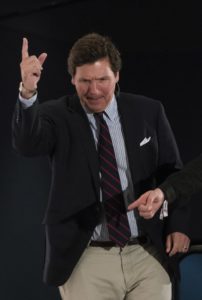
Who or what formed your political thinking?
I’d like to think that my political thinking is shaped by reality. So my views on politics have changed dramatically over the past 25 years as the country has changed dramatically. There were a lot of things that I supported in the early ’90s which I abhor now. A lot of ideas I held turned out to be wrong. So my views have changed. Well, I mean I thought the war in Iraq would be a good idea and a lot of the people who supported that seemed like trustworthy smart people to me and I took their word for it and I shouldn’t have. And when I realized how wrong I was after I went to Iraq in 2003 right after the war began, I realized just how wrong I had been and it made me rethink a lot of the assumptions I had about foreign policy. Twenty-five years ago, I thought that cutting capital gains taxes to half the rate of labor would make the country more prosperous. And I was wrong. It made a small group very prosperous, but it didn’t do anything for the middle class. And I wish I had been wise enough to know that at the time. At one point I was very pro choice. I believed that abortion was as simple as a woman’s choice. I didn’t understand that there was another side to it, which is the taking of a human life. And that’s a very ugly thing and a very heavy thing, but I didn’t get it. My views change all the time, but the way I approach the news has not changed and that’s where there’s deep skepticism. I learned that from my father, who didn’t graduate high school but he was a deeply learned man and a compulsive reader and a very old fashioned news guy who started working in news 55 years ago. He was the kind of person who didn’t take anything at face value. Every fact needed to be checked and every assumption needed to be examined carefully. And that’s just the way he approached his life. I definitely inherited that from him. What I’m surprised by is not that the press is tough on Trump, but that they don’t focus on anybody else. There are a lot of powerful people in our country who get no scrutiny. I would say Jeff Bezos, who founded Amazon, is a perfect example. He is literally the richest man in the world and controls a lot of the internet to the server funds that Amazon owns. He holds profound influence over America and is never held up to scrutiny. And maybe that’s because he owns The Washington Post. So a functional media would be deeply skeptical of someone with that much power, but they’re not. They suck up to him. They lionize him you know, and I think that’s disgusting. So I think most of the press coverage is contemptible and again, it’s not because they’re liberal, they’re not liberal, actually. They don’t believe in free speech or democracy or the traditional liberal values. I do. I’m a liberal here. They are the apologists for corporate power here. The fascists. So yeah, I have real contempt for a lot of our media.
You recently said on your show that America is a broke country that thinks it is still rich. Can you expand on that statement?
Well, as a mathematical question, yes, our debt is unpayable and the debt is not just what we borrowed from other countries such as … China. The debt includes the unfunded promises that we’ve made to our retirees in the public sector which are literally not payable. If you owe more than you have, you’re not rich by definition and yet the assumption is that the United States is the richest country in the world — it’s not — and that we can pay any price for the things that we want, which is like absurd, actually. Some are acting out of the assumptions that were formed 30 years ago that are no longer true, which is the way people are. They don’t update their impressions. Things change, but they act as if they haven’t changed and that’s where public conversation starts.
Some of your political stances obviously irked some people as evidenced by the protest outside your home. Did police ever determine who was behind that and did it unnerve your family?
We know who’s behind it because some of them bragged about it and they vandalized my house and terrified my wife and no, no one’s going to do anything about it because they’re on the left. I know that. I’m not brooding about it. For my family, the key is really to keep from becoming angry and paranoid. That’s the real cost. Speaking for myself, I’m not worried about being hurt; I’m worried about my family being hurt. The worst that can happen is they can kill you and we’re all going to die anyway. I’m not a fatalist. It doesn’t bother me at all. What I’m worried about is living in a way that’s reactive where you’re afraid all the time and you can’t go anywhere. You think people are watching you and it corrupts your soul. It makes you angry. And I’ve seen that happen to other people in my position who have this job and are under attack all the time and they become defensive and mad. I’m a Christian, so I really believe that harboring anger at other people destroys you. I really believe that. I don’t want to feel that way. I don’t want to feel angry. I don’t want to feel self-conscious. That’s been the struggle for us and because it happened at our home and you’re comfortable in your own house, which is a huge cost. But you know, it’s getting better.
You always seem to give some real thought to your position on things. But in the landscape of sound bites, slogans or frustrated shouting matches in today’s news, is there really room for genuine, intellectual conversation?
I try really hard because I know I’m not going to have this job forever. We’re all just passing through, we’re all going to die. I try to remember that every morning. I’m an Episcopalian and there is a line in the Episcopal liturgy on Ash Wednesday and it says, basically you began as dust and to dust you will return. I try to remember that every day is just a moment in time. While I have this job, I do
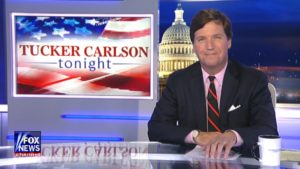 my very best to tell the truth and to try and not be afraid and to get to the issues that actually matter. I will say it’s television, so there’s always a temptation to go with the stories that you know, provoke the most immediate response, to go with the sugar-high of some dumb story and certainly we do that sometimes, but we try not to. And the other thing I’ve really tried to do self-consciously, and we always talk about this at work, is we have power because we have a TV show and people watch it, so you need to make certain that you’re going after worthy opponents. It’s very easy on television to pick someone who’s done something wrong and just land on them, crush them. Here’s a picture of so-and-so and he’s a bad person and here’s his phone number. I don’t want to do that. I don’t want to misuse power. I want to make sure the people we’re going after are powerful people. … So the people we go after, like Google, are the most powerful companies in the world, and the government of China, the biggest country in the world. I want to make certain that we’re not being bullies, that we’re being the opposite of bullies. I really care about that. And you know, we don’t always reach that standard, but I try.
my very best to tell the truth and to try and not be afraid and to get to the issues that actually matter. I will say it’s television, so there’s always a temptation to go with the stories that you know, provoke the most immediate response, to go with the sugar-high of some dumb story and certainly we do that sometimes, but we try not to. And the other thing I’ve really tried to do self-consciously, and we always talk about this at work, is we have power because we have a TV show and people watch it, so you need to make certain that you’re going after worthy opponents. It’s very easy on television to pick someone who’s done something wrong and just land on them, crush them. Here’s a picture of so-and-so and he’s a bad person and here’s his phone number. I don’t want to do that. I don’t want to misuse power. I want to make sure the people we’re going after are powerful people. … So the people we go after, like Google, are the most powerful companies in the world, and the government of China, the biggest country in the world. I want to make certain that we’re not being bullies, that we’re being the opposite of bullies. I really care about that. And you know, we don’t always reach that standard, but I try.
Let’s shift to the midterm elections. If you would, share your thoughts on whether the outcome surprised you, whether you think the two branches of Congress can work together to pass meaningful legislation, or whether we’re headed for two years of gridlock.
Our presidential campaign just started. I hate to say that, but it’s true. We are going to be debating that and every politician is distracted by the possibility he could be president. That does not improve people’s behavior or the prospect of bipartisan cooperation when you’ve got a presidential campaign going on. What I was so interested in seeing in the last midterm election was how the realignment basically is complete now. The Republican Party was always the party of management. The Democratic Party was the party of wage earners, a middle class and working-class party. The Republican Party was famously the party of the country club. It is now the opposite. The Republican Party is the party in the middle class. They don’t always want to be that, but that’s in fact what they are. And the Democratic Party is the party of the rich and the poor. So out of the top 10 richest zip codes in the country, all of them are now represented by Democrats. Of the top 50, 42 are represented by Democrats. All of Orange County is now Democrat. Why? Because it’s the home of affluent, well-educated people and I don’t think we’ve updated our assumptions about this. Wall Street, big tech, the most affluent people in America vote Democrat now. That’s why Arkansas and West Virginia, big middle-class states that always voted Democrat, are now voting Republican. It’s an economics question. It’s really interesting.
So you think we’re in for two years of gridlock?
I would think so. We’ve just had two years of that. From my perspective, the most important thing is not what laws get passed, but you know, what public conversations we have. As long as we’re talking about things that actually matter, the country will get better.
Let’s talk about your recently published book “S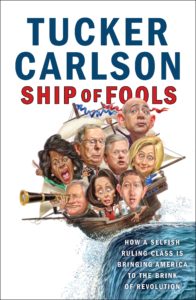 hip of Fools.” What prompted you to write the book and what is the message you’re trying to convey?
hip of Fools.” What prompted you to write the book and what is the message you’re trying to convey?
I basically wrote it for the same reason I have ever written anything, which is because I was deeply annoyed. That’s always the reason, right? I was mad that no one in Washington who I know personally had spent two minutes to tell you why Donald Trump got elected.
Why did he get elected?
He got elected because people in charge on both sides and both parties had done a really bad job of running the country. They mismanaged the economy. They made a small number of people incredibly rich. They got us into a lot of foreign wars which took the lives of some of our best people and cost us a ton of money and didn’t make America safer or richer. So they screwed up and they never admitted it, and anyone who asks them about it gets yelled at. They disqualified themselves and electing Trump was a way for the rest of the country to say, “You did a terrible job, we’re really mad at you and we’re going to let this very loud orange man get your attention.” And the people who run the country didn’t even pause and ask what message our voters were sending us. They were like, “no, no, no. Russia did this,” and it created this insane conspiracy theory.
What are Trump’s chances in 2020?
If they [Democrats] keep focusing on him, it’s very good. Democrats for the past few years have made everything be about Trump. “Trump is evil.” Well, Trump’s not evil. Trump has a lot of bad qualities. He doesn’t hide them, they’re very obvious. You don’t have to wonder what Trump thinks, he’ll just tell you and maybe you like it or maybe you don’t. But to say that he’s the cause of all of our problems is like insane. He got elected because of our unaddressed problems. I think if you came to this country from Mars and you weren’t a Republican or a Democrat, and you were just watching and trying to figure out what was going on, you would reach that conclusion because it’s obvious. But none of the geniuses running our country were willing to reach that conclusion because it implicates them, makes them look bad.
Share with us the overarching theme of the book.
The overarching theme is really clear: It’s that the debates we’re having aren’t really between left and right or even Republicans and Democrats, they’re between people who have gotten richer or poorer since the financial collapse in 2008. Where do you live, for example? [Little Rock], Arkansas, is a perfect example. A lot of Arkansas is not richer than it was, except for the northwest part of the state, which is a totally different world. But is El Dorado richer than it was in 2008? And yet a small number of cities are much, much richer than they were and everyone else has less. So that’s really the debate. You know, it’s the people who are benefiting from our current policies versus everyone else.
How did they get richer?
It’s a complicated story, but I would just summarize it by saying this: The economy moved from a manufacturing economy to primarily a finance economy and a tech economy. No one person decided this, this was the product of many choices over many years. But the net result is an economy where only a relatively few people reap most of the benefit and that makes for an unstable country, and conservatives didn’t want to admit this because it sounded like they were socialists or something, and liberals didn’t want to admit it because they were the ones getting rich. In 2015 for the first time in a hundred years, the middle class became the minority in this country. That’s a disaster. You can’t have a democracy except in a middle-class country, period. And yet no one even noticed.
Truckload Authority will be read by 3,000 trucking executives. What’s your message to them about the importance of the trucking industry?
If you care about employment, it’s absolutely vital. And this is why I’m so concerned about autonomous vehicles driving all commercial driving. This would include ambulances, school buses, taxis, but also trucking. Long distance and local trucking is the single biggest employer of high-school educated men in America. It’s No. 1 in all 50 states. So it’s a huge part of the economy. Now, the way that we understand trucking is part of the supply chain in Washington. So we think of trucking as the way that, you know, Amazon gets its goods to market, brings the paper towels to your house after you ordered them. That’s true. It’s a vital link that makes commerce possible. Of course, the way policymakers also need to think about trucking is as one of the biggest and most important employers of men in this country. Male-dominated occupations, working-class occupations are in decline. I know that it’s unfashionable to care about what men do for a living; it’s fashionable to hate men. But 50 percent of our population is male. And if men don’t succeed in the workplace, they don’t get married and families fall apart. And so it is absolutely essential that our policymakers care about what men do for work and in rural America, male jobs have disappeared to a large extent. Disappeared. So automation in the agricultural sector has, you know, increased dramatically over a hundred years. And over time it has dramatically reduced the number of jobs and those are the remainder of the lowest jobs that primarily are taken up by foreign labor, and manufacturing is dying. And so really trucking is like an essential part of the economy outside the cities in all 50 states. It really matters. If you replace all truck drivers tomorrow with autonomous vehicles, you know, the society would collapse outside the cities in a lot of places. You put millions of men out of work and families would collapse around them. That’s a big thing. No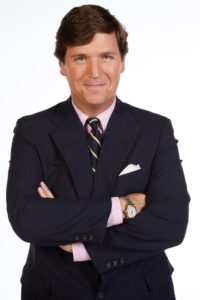 one seems to care, which tells you a lot.
one seems to care, which tells you a lot.
Do you have any political aspirations?
Well, I couldn’t get elected room mother, but thank you for asking. Why? I’m always giving my opinion and a lot of people disagree with me. But I’ve never said anything I didn’t believe, but I’ve been wrong a lot. And as I told you, I’ve had a lot of dumb opinions. I don’t know if that reflects poorly on me or not, but everything I say I mean with total sincerity and I don’t think that’s the way you get elected.
You’ve said a lot about immigration. Where do you stand on the immigration situation? You’ve got Trump wanting to block them out, you’ve the Democrats wanting to let them in. Where do you stand on immigration?
I’m for immigration. I think immigration is good, but not every immigrant is the same. If you’re in charge of the country, you’ve got a responsibility to think about the effects of your decisions on the people who live in the country. Just like if you’re a parent, you have responsibility to think about your children. It’s the same dynamic. And so to act like all immigrants are equally good is insane. We have an economy that’s becoming increasingly sophisticated and automated and requires increasingly higher levels of education to meaningfully participate in. Yet the majority of our immigrants have high school educations or less. Why are we importing people who can’t, on average, meaningfully participate in what our economy is becoming? It’s insane. So what you’re doing is creating a massive and permanent underclass and that makes the country poor and more unstable and that’s why California, which when I left it 35 years ago was the richest state, now has more poverty than any state because it has more low-skilled immigrants than any state. Of non-citizens in California, over 70 percent are on welfare. There are millions of them, so anyone who’s telling you that system is good for the country is either ignorant or lying. It’s terrible. Now, it’s very good for certain employers. It’s been great for the chicken plants because they can pay less, but the only reason they pay less is because the rest of us middle-class taxpayers pay the difference in housing subsidies and food stamps and health care education. We’re paying for big companies to pay their workers crappy wages. Why are we doing that? So companies can get richer and leave us with a society where people have nothing in common and don’t speak the same language. It’s nuts. And the Democratic Party has decided that they’re all in on this because these people will ultimately be voters once they get amnesty and citizenship. But the effect on the country is ruinous and that’s why Trump got elected because he was saying that out loud. He was right. Trump hasn’t been right about everything, but he was right about that.
Lyndon Finney’s publishing career spans over 55 years beginning with a reporter position with the Southwest Times Record in Fort Smith, Arkansas, in 1965. Since then he’s been a newspaper editor at the Southwest Times Record, served five years as assistant managing editor of the Arkansas Democrat-Gazette in Little Rock and from November 2004 through December 2019 served as editor of The Trucker. Between newspaper jobs he spent 14 years as director of communications at Baptist Health, Arkansas’ largest healthcare system. In addition to his publishing career he served for 46 years as organist at Little Rock’s largest Baptist church.

